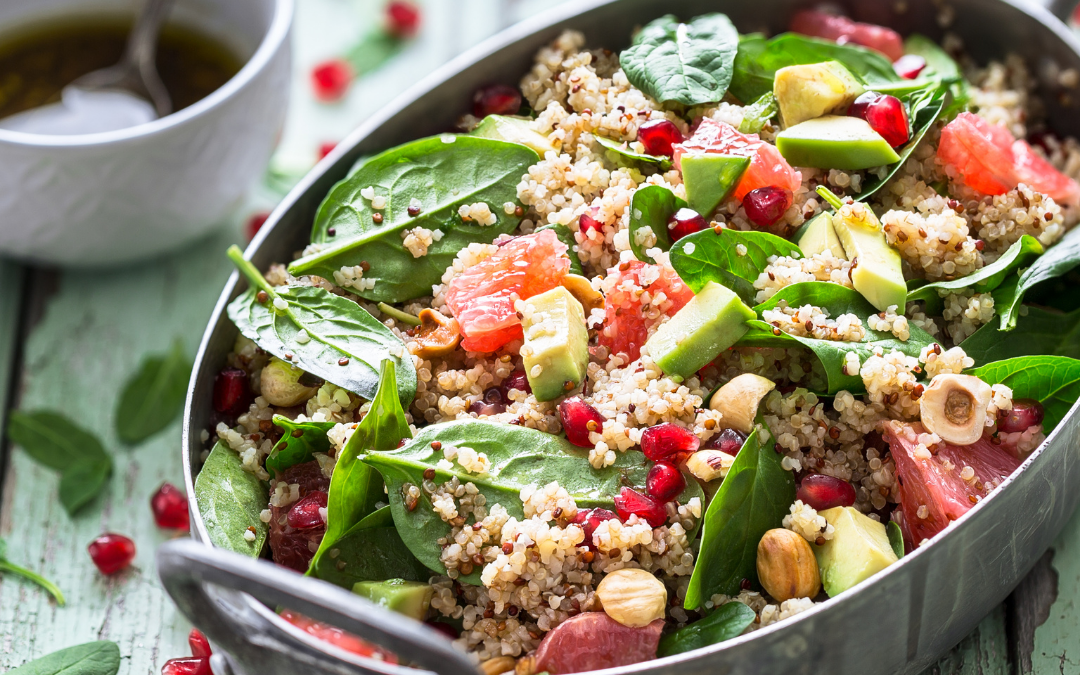Es uno de los pocos alimentos de origen vegetal que se considera una proteína completa. Con todas estas propiedades, comer habitualmente quinoa (se recomiendan 48 gramos al día) reduce el riesgo de sufrir enfermedades cardiovasculares, diabetes tipo 2, presión arterial alta, cáncer de colon y obesidad.
Aquí te contamos 8 beneficios los cuales te sorprenderán, tambien te anticipo que leerás mucho, pero es información valiosa
1- Posee vitaminas
Como la A, E, del grupo B (Tiamina, Riboflavina, Niacina) y Acido ascórbico. Las vitaminas del grupo A ayudan a la formación y mantenimiento de los dientes, tejidos blandos y óseos, y a la buena visión. La vitamina E posee antioxidantes previniendo el daño que ocasionan los radicales libres en el cuerpo (alergias, cáncer, envejecimiento prematuro, etc). La vitamina B ayuda a la formación de glóbulos rojos. El ácido ascórbico ayuda a la formación y mantenimiento del colágeno, de vital importancia en la edad adulta ya que con el tiempo esta disminuye. El colágeno es de suma importancia, ya que reduce el dolor articular, mejora la salud de la piel, uñas y cabello.
2- Bajo índice glicémico
Lo que hace que pueda ser consumida por adultos mayores con diabetes o que quieran bajar o mantener su peso
3- No contiene gluten
Lo cual favorece a los adultos mayores con enfermedad celiaca o intolerancia al gluten.
4- Regula el colesterol
Debido a su alto contenido en fibras mejora el tránsito intestinal y el desarrollo de la flora bacteriana benéfica.
5- Contiene un alto contenido de grasas insaturadas
Destacándose la presencia de ácidos Omega 3 y 6. Alto contenido de ácido graso oleico y menor de linoleico, los cuales intervienen en el tratamiento, prevención y mejoría de ciertas patologías como la diabetes, esclerosis y problemas cardiovasculares.
6- Posee un alto índice de proteínas y minerales
A diferencia de los cereales posee calcio, fósforo, hierro, magnesio y zinc que ayudan en los diversos problemas de salud como: enfermedades autoinmunes, musculares, hipertensión, anemia, obstrucciones de los vasos sanguíneos.
7- Alto contenido en Calcio
Lo cual ayuda a evitar la descalcificación y desarrollar osteoporosis o fragilidad ósea.
8- Posee aminoácidos esenciales
Los aminoacidos colaboran en el buen funcionamiento del cuerpo humano, citamos algunos:
• Fenilalanina.- que es un estimulante cerebral.
• Alananina.- que es una buena fuente de energía para el cerebro
• Glicina.- que actúa como regulador de la función motora
• Acido glutámico.- Interviene en las funciones para el aprendizaje, la memorización y la plasticidad neuronal que no es otra cosa que la regeneración de neuronas anatómica y funcionalmente que han sufrido algún daño por accidente cardiovascular.
• Acido aspártico: mejora la función hepática y es indispensable para el mantenimiento cardiovascular.
• Tirosina: que tiene una acción antiestress, ayuda en la depresión y ansiedad.
• Lisina: ayuda a la formación de anticuerpos para defender al organismo de las enfermedades, ayuda a la función gástrica, en la reparación celular y en el transporte y absorción del Ca.
It is one of the few plant-based foods that is considered a complete protein. With all these properties, eating quinoa regularly (48 grams per day are recommended) reduces the risk of cardiovascular disease, type 2 diabetes, high blood pressure, colon cancer and obesity.
Here we tell you 8 benefits which will surprise you, I also anticipate that you will read a lot, but it is valuable information.
1- It has vitamins
Such as A, E, group B (Thiamine, Riboflavin, Niacin) and ascorbic acid. Group A vitamins help in the formation and maintenance of teeth, soft and bone tissues, and good vision. Vitamin E has antioxidants preventing the damage caused by free radicals in the body (allergies, cancer, premature aging, etc). Vitamin B helps the formation of red blood cells. Ascorbic acid helps in the formation and maintenance of collagen, which is of vital importance in adulthood as it decreases over time. Collagen is of utmost importance as it reduces joint pain, improves the health of skin, nails and hair.
2- Low glycemic index
It can be consumed by older adults with diabetes or those who want to lose or maintain their weight.
3- Does not contain gluten
Which favors older adults with celiac disease or gluten intolerance.
4- Regulates cholesterol
Due to its high fiber content, it improves intestinal transit and the development of beneficial bacterial flora.
5- Contains a high content of unsaturated fats.
High content of oleic fatty acid and lower content of linoleic acid, which are involved in the treatment, prevention and improvement of certain pathologies such as diabetes, sclerosis and cardiovascular problems.
6- It has a high level of proteins and minerals.
Unlike cereals, it has calcium, phosphorus, iron, magnesium and zinc that help in various health problems such as: autoimmune diseases, muscular, hypertension, anemia, obstructions of blood vessels.
7- High calcium content
Which helps to avoid decalcification and the development of osteoporosis or bone fragility.
8- It has essential amino acids
Amino acids collaborate in the proper functioning of the human body, here are some of them:
– Phenylalanine – which is a brain stimulant.
– Alananine, which is a good source of energy for the brain.
– Glycine, which acts as a regulator of motor function.
– Glutamic acid: it intervenes in the functions for learning, memorization and neuronal plasticity, which is nothing more than the regeneration of neurons anatomically and functionally that have suffered some damage due to a cardiovascular accident.
– Aspartic acid: improves liver function and is essential for cardiovascular maintenance.
– Tyrosine: which has an anti-stress action, helps in depression and anxiety.
– Lysine: helps in the formation of antibodies to defend the body against diseases, helps in gastric function, in cellular repair and in the transport and absorption of Ca.








